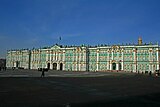Chancellor of Vierzland
This article is incomplete because it is pending further input from participants, or it is a work-in-progress by one author. Please comment on this article's talk page to share your input, comments and questions. Note: To contribute to this article, you may need to seek help from the author(s) of this page. |
| Chancellor of the Vierz Federation | |
|---|---|
| Kanzler der Vierzische Föderation | |
 | |
| Executive branch of the Vierz government | |
| Style | Herr Kanzler / Frau Kanzlerin ("Mr./Mrs. Chancellor") Their Excellency (in international correspondence) |
| Status | Head of state Head of government |
| Member of | Federal Council National Security Council Wehrmacht High Command |
| Residence | Vierz Chancellery Building |
| Seat | Wernerhof |
| Term length | 5 years; renewable twice |
| Inaugural holder | Friedrich Geiger |
| Formation | 7 June 1766 |
| Salary | 300,000 VZM, annual |
| Website | kanzlei |
 |
|---|
| This article is part of a series on the politics and government of Vierzland |
The Chancellor of Vierzland (Vierz: Kanzler Vierzlands), officially the Chancellor of the Vierz Federation (Vierz: Kanzler der Vierzische Föderation), is the head of state and head of government of Vierzland.
The constitution ordains the appointment of the Chancellor by a simple majority vote in the Federal Assembly. The Chancellor is the head of the executive branch as chairperson of the Federal Council.
Chancellors may serve a maximum of three, five-year terms, consecutive or nonconsecutive. It is a historical convention that the Chancellor also be a member of the legislature; this norm has only been broken three times with the chancelleries of Hermann Eschau, Helmut Bergmann, and Stefan Vogt.
In the Vierz Empire, the Reichskanzler (Reich Chancellor) was normally elected by the Imperial Assembly and approved by the Kaiser. The de facto power of the Chancellor, referred to as Kanzlerswirksamkeit ("Chancellor's efficacy/effectiveness"), varied considerably over the course of the empire's lifespan, with some Chancellors more subordinate to the Kaiser and others more independent and authoritative.
The current Chancellor is Kaspar Vahl, who is serving his second term in office after the 2017 elections. Nick Krämer is the current Deputy Chancellor.
History
Vierz Kingdom
Vierz Empire
Kanzlerswirksamkeit
Modern situation
Appointment
Powers and responsibilities
Deputy chancellor
There are no constitutional or legislative provisions mandating the appointment of a Deputy Chancellor. According to Chapter III of the Vierz Constitution, incapacitation or resignation of the Chancellor before an election results in either "their immediate deputy, or the President of the Federal Assembly" becoming acting chancellor until an election can be held.
Some chancellors have appointed one or multiple Deputy Chancellors. Any and all appointed deputies must be approved by majority vote of the Federal Assembly. Unlike ministers, deputies may be dismissed by the Chancellor without consent of the assembly. If multiple deputies are appointed, then it is customary for one to be designated as the primary among them in the style of "First Deputy Chancellor".
The Deputy Chancellor has no de jure powers or responsibilities according to the constitution, but de facto receives authority from the Chancellor. It is generally assumed that their power cannot surpass that of the Chancellor. Typically, the Deputy Chancellor, if there is one, may chair meetings where the Chancellor otherwise could not. Occasionally the deputy is discharged on diplomatic missions in place of the Foreign Minister.
Official residence
The primary official residence and workplace of the Chancellor is the Wernerhof in Adtrus. The building is named for Heinrich Werner. The term Wernerhof is often used metonymically to refer to the executive government of Vierzland as a whole, which includes both the chancellery and the Federal Council.
In addition to the Adtrus complex, the Chancellor maintains an official residence and workplace in Bertenau in Maslaar Palace, which was former part-time lodging for the Vierz emperor.


